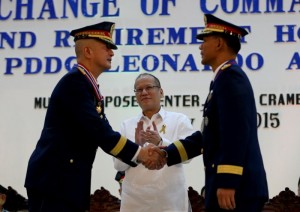
JULY 17 — President Benigno S. Aquino III on Thursday expressed his gratitude to Police Deputy Director General Leonardo Espina for leading the police during his seven-month stint as Officer in Charge (OIC) of the Philippine National Police (PNP).
The President led the PNP Change of Command ceremony and the retirement honors for Espina in Camp Crame.
In his speech during the event, the President praised Espina for his humility and dedication even during very challenging times.
Spelling out the PNP’s successes under Espina’s watch, President Aquino cited the apprehension of Miguel Omayao, a ranking leader of the Communist Party of the Philippines-New People’s Army-National Democratic Front’s (CPP-NPA-NDF) West Central Mindanao Front.
He also noted the capture or neutralization of such criminal gangs as the Bathala Drug group and 17,300 wanted individuals, as well as the good coordination between the police and the Armed Forces of the Philippines (AFP) to ensure peace and order across the country.
The PNP-AFP coordination resulted in the arrest of communist leaders Ruben Saluta, Emmanuel Bacarra, and Rodrigo Tayasan, as well as notorious terrorist Mohamad Ali Tambako and four others, the President said.
“Dindo, sa maikling panahon na ika’y naglingkod bilang OIC, at sa ibang naging tungkulin mo gaya ng magsilbi kang hepe ng NCRPO (National Capital Region Police Office), ipinamalas mo ang galing at propesyonalismong hinihiling sa mga tagapagtupad ng batas,” he said, addressing Espina.
“Sa araw na ito, tanggapin mo ang taos-pusong pasasalamat ng sambayanan para sa lahat ng iyong sakripisyo’t pagsisikap.”
Espina, he said, is leaving a legacy of a more effective police force.
As the new PNP chief, Police Director General Ricardo Marquez, takes over, the President said he expects him to continue the reforms that Espina has begun.
This includes cleaning the police ranks, and ensuring an honest and credible presidential election next year.
President Aquino also assured the police force that the government is striving to improve their capabilities and equipment, as well as their benefits.
Part of this, he said, is to attain the 1:1 police-to-pistol ratio, the first in PNP’s history, as well as the implementation of the PNP Capability Enhancement Program and the enhancement of the police’s ability to effectively “shoot, scoot, and communicate”.
The government is also working to give policemen affordable and decent housing and fix their pension system, he added.
President Aquino called on the members of the PNP to remain committed to their oath to attain national progress.
“Sa patuloy na pagtupad sa inyong tungkulin, tumutulong kayong hubugin ang kinabukasan na karapat-dapat para sa ating lahat,” he said.
“Tama lang po na ibuhos natin ang lahat ng magagawa natin, para tiyak na maipamana ang isang mas magandang Pilipinas sa susunod na salinlahi: Isang bansa na mas mapayapa, mas ligtas, at mas matatayog ang inaabot na pangarap.” PND (as)







